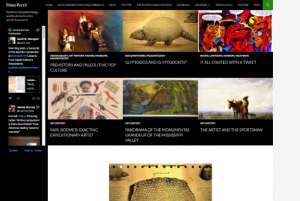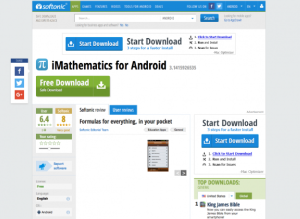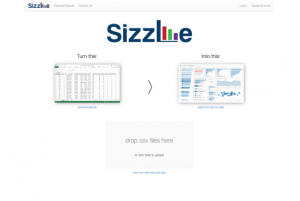Research and Education
Back to Top
|
 |
|
Ambitious Science Teaching
|
Science |
|
Ambitious Science Teaching offers tools and ideas for K-12 science classrooms and serves as a social networking site for science educators. Created by the University of Washington, with support from the National Science Foundation (NSF), Ambitious Science Teaching is a pedagogical philosophy that emphasizes student-centered inquiry and learning and authentic assessments. On this website, teachers can check out video guides that demonstrate the principles of this pedagogy. In addition, the website includes a Video gallery with videos of full lessons - or even units - accompanied by written explanations of the instructor's objectives and strategies. For example, one resource features video clips from a nine-day unit about the physics of sound from a 9th grade physical science class. Meanwhile, in the Tools section, teachers can download a variety of graphic organizers, templates, unit guides, and more. Finally, science teachers looking to connect with other instructors in their field and share ideas can do so via the Community aspect of this website. [MMB] |
|





|
|
 |
|
The British Library: Discovering Literature: 20th Century
|
Language Arts |
|
From the British Library comes this remarkable, engaging collection of critical essays, videos, biographical sketches, and original documents related to 20th century British literature. Readers will find close readings of poetry by Sylvia Plath, W.H. Auden, and T.S. Elliot (among others); an essay about the role of music in influencing the work of W.H. Auden; and an essay about postcards sent by Angela Carter. Embedded within each of these essays are related materials from the British Library, including original manuscripts, copies of diary entries and letters, and other primary documents. These essays are perhaps best searched by theme (including European Influence, Gender and Sexuality, Art, Music, and Popular Culture). Alternatively, visitors can also read short - yet informative - biographical sketches of a number of key writers and explore related articles on individual author pages. Those interested in exploring the digitized items from the British Library on their own can browse or search the 300+ artifacts in Collection Items. High school and college educators will also want to check out the Teaching Resources related to this collection. [MMB] |
|





|
|
 |
|
Mapping Inequality
|
Social studies |
|
President Franklin D. Roosevelt created the Home Owner's Loan Corporation (HOLC) as part of the New Deal to provide loans that would enable citizens to buy homes. Between 1935 and 1945, the HOLC, in partnership with mortgage lenders, housing developers, and real estate appraisers, assessed and mapped the relative risk of providing home loans to individuals looking to purchase homes in different neighborhoods. Race played a central role in the HOLC's conception of the riskiness of a neighborhood; as a result, white homeowners were able to gain low-interest mortgages from the HOLC that black and Latino homeowners were largely denied. Scholars from the University of Richmond's Digital Scholarship Lab, the University of Maryland's College of Information Sciences ("iSchool"), and Virginia Tech, in collaboration with historian N.B.D. Connelly, have collaborated to digitize these maps alongside census information from 1930 and 1940. Visitors to this website can explore how different neighborhoods were "graded" by the HOLC and read area descriptions, authored by HOLC appraisers, for individual neighborhoods. Mapping Inequality currently includes 150 HOLC maps and over 5,000 descriptions. This project offers considerable insight into the history, sociology, and economics of American cities. [MMB] |
|





|
|
 |
|
 |
|
ATLAS: Numeracy Resource Library Site Map
|
Mathematics |
|
For mathematics instructors and tutors, Hamline University's Adult Basic Education (ABE) Teaching and Learning Advancement System (ATLAS) has compiled this resource library of materials for teaching numeracy and mathematics. These resources include instructional videos, curricular guides, lesson plans, blogs, select articles, and webinars designed for mathematics instruction. While designed for educators of adults, many included resources are created with K-12 students in mind, and almost all resources can be adapted for a variety of student populations. Instructors can browse resources by content area (Numbers and Operations, Algebra, Geometry, Statistics) or by Instructional Resources, which include a variety of topics including Equity, Professional Organizations, and Reference & Definitions. This website also contains a number of resources regarding the College and Career Readiness Math Content Standards; in addition, many resources here align with the Common Core Standards. [MMB] |
|





|
|
 |
|
The Association of Religion Data Archives
|
Religion |
|
From Pennsylvania State University, with support from the Lilly Endowment and the John Templeton Foundation, the Associate of Religion Data Archives (ARDA; formerly known as the American Religion Data Archive) is an extensive online repository for data about religion around the world. Aimed at educators, researchers, journalists, and religious congregations, the ARDA features U.S. and international religious surveys and congregation membership data. One highlight of this website's data collection is the Congregational Resource Center; here, visitors can explore religious affiliation data alongside a number of indexes about religious freedom in that country. In addition to a wealth of data, the site boasts a number of teaching tools, including lesson plans and sample syllabi for religious studies and social science classrooms. Also of note are three interactive timelines that highlight the history of religion in the United States and a number of family trees, which trace the development of a number of religions over time. [MMB] |
|





|
|
 |
|
Early Modern Texts
|
Philosophy |
|
When reading early modern philosophical texts, many undergraduate students struggle to understand their content, in part because these texts were written (or translated) into now-antiquated English. To address this obstacle, Jonathan Bennett, a former philosophy lecturer at the University of Cambridge and Syracuse University (among other schools), adapted a number of early modern texts to make them more comprehensible to contemporary students. At Early Modern Texts, philosophy students and instructors can download and read a number of key texts written between the sixteenth and nineteenth centuries. These texts include major works by Niccolo Machiavelli, Rene Descartes, Baruch Spinoza, and Immanuel Kant. To prepare these texts, Bennett "translated" obsolete language, edited individual sentences into simpler syntax, and organized certain passages by adding paragraph indentations, numbers, and bullets. Instructors and students can read more about Bennett's process in Frequently Asked Questions. By providing these translated versions, Early Modern Texts aims to enable philosophy students to engage with the major ideas behind crucial texts without being encumbered by antiquated language, lengthy sentences, or page-long paragraphs. [MMB] |
|





|
|
 |
|
John Hopkins School of Public Health: Urban Health in Developing Countries
|
Health |
|
The Johns Hopkins' Bloomberg School of Public Health offers this free online course on Urban Health in Developing Countries. Taught by Abdullah Baqui and William Brieger, two senior professors in the Department of International Health, this course addresses "urban demography, epidemiology, changes in urban physical and social environment and their consequences for health, nutritional issues, the inadequacy of conventional health services, and the design and implementation of a coordinated and cost-effective health care system." Here, readers will find all lecture slides, readings, and assignments used to teach this course in Spring of 2009. There are also a number of recorded lectures from a handful of guest speakers and links to related resources. This online course is a valuable resource for anyone seeking to better understand issues relating to urbanization, geography, globalization, and public health. [MMB] |
|





|
|























